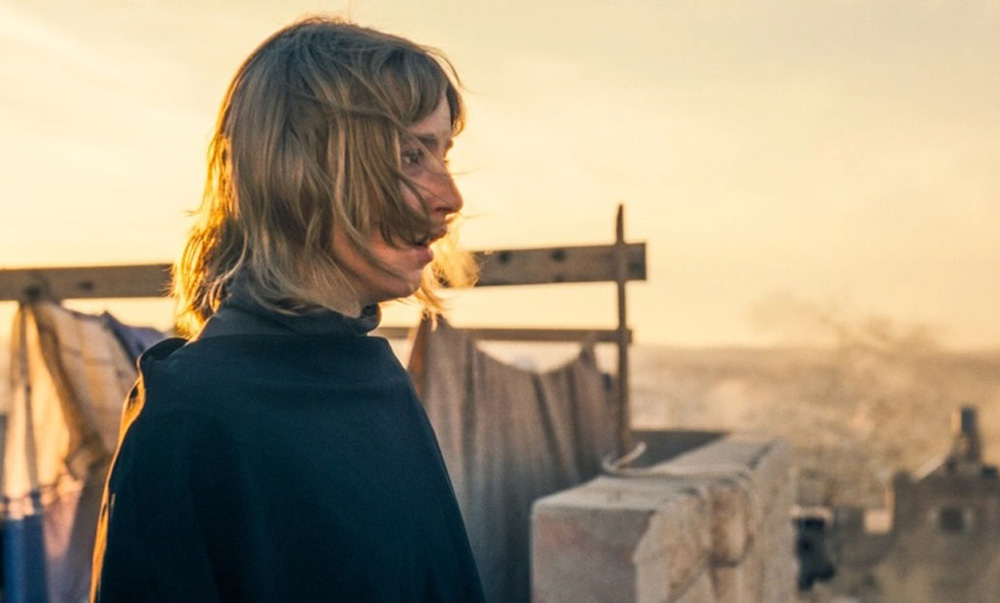“If they come here, it’s because something fundamental is missing in them,” the woman only known as Madame (Lubna Azabal) tells Jessica (Megan Northam) in “Rabia,” not entirely willing to confide what it was that led her to Syria after studying law at the Sorbonne. It surely wasn’t the actual work involved when Mareike Engelhardt’s provocative drama unfolds in 2014 and Madame took an unusual place in the operations of the terrorist organization ISIS, overseeing a program to bring young women over to the country for the purposes of being concubines for the men fighting for their extremist beliefs. A position where rewards may be promised in the afterlife by the Islamic State, it is a grim undertaking where Madame’s administrative skills and devout faith have made her one of the few who could have the stomach for it as others from across the world are flown in with the notion that they’re serving a higher purpose and find they’ve been led to hell on earth. Madame isn’t about to reveal what was missing in herself to arrive at this place, but revealing even the mildest of details of her life before are a sign that Jessica’s done something to win her trust, no small feat in a situation where male dominance is so thorough that while few are seen in “Rabia,” women such as Madame uphold a system in which they’re encouraged to see each other as duplicitous and to have contempt for one another in an effort to be broken down and entirely subservient.
Although the villains aren’t subtle in “Rabia,” where beyond the largely impervious Madame, her orders are carried out by a calm pair of sisters known as the Terror Twins, but what Engelhardt gets at in her compelling feature debut is something that usually can’t be seen at all when following the radicalization of Jessica, who is rechristened Rabia upon entering the caliphate in a sign of a complete loss of her identity in the film to come. Eager to leave a miserable life in France where the only job she can find is taking care of incontinent seniors and has to come home to an indifferent father who is just as exhausting to deal with, she jumps at the opportunity to join her friend Laila on a one-way ticket to Damascus after Laila has heard that a suitor is awaiting her. Engelhardt’s resistance to keeping the religious underpinnings of the story relatively abstract doesn’t always serve the film well when it leans on certain broad stereotypes to keep it moving based on what an audience can assume, but the sight of Jessica retreating to the attic of her house to pray facing the sun is enough to explain her reasoning beyond her godawful circumstances to take a chance on leaving everything behind when what awaits couldn’t possibly be worse.
Of course, she’s proven wrong almost immediately when huddled into a dilapidated building with other women her age and forced into giving up any connection to the outside world, surrendering her cell phone and all other belongings. If it seems like Jessica’s been given the bait-and-switch, Engelhardt has one in store herself with a more admirable goal in mind as the renamed Rabia is sufficiently demoralized to become a servant to Madame after her moment to be married off goes horribly awry. Separated from Laila who is assigned a husband, Rabia has a front row seat to the process of deceiving devout women to come to Syria and gradually becomes more and more complicit in the same activities that landed her in such dire straits. Lensed by longtime Claire Denis and Ursula Meier collaborator Agnes Godard, the stark imagery only ever emphasizes the moral gray areas that Jessica/Rabia navigates to ensure her own survival and although a lack of narrative nuance can threaten to take the film into a more melodramatic realm, “Rabia” is generally served well by its boldness, presenting a no man’s land cultivated entirely by the patriarchy.
“Rabia” does not yet have U.S. distribution.




